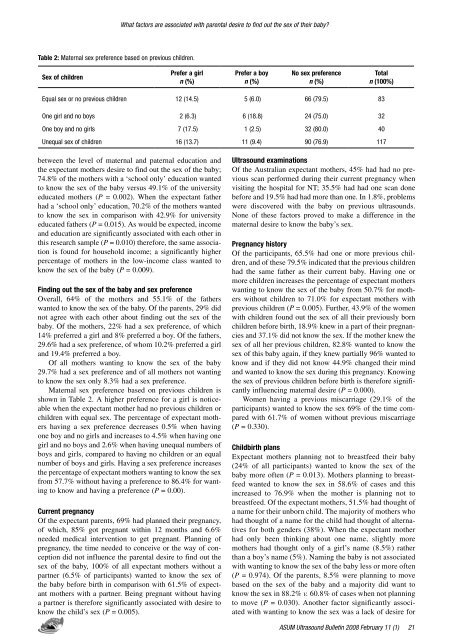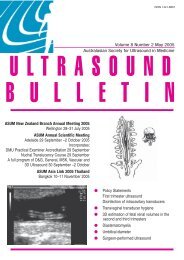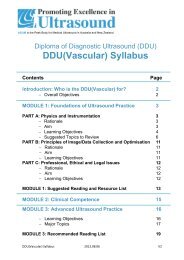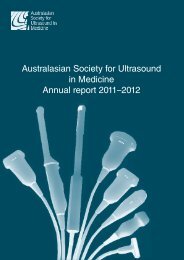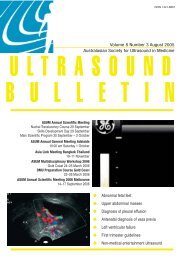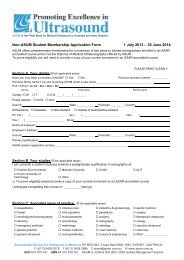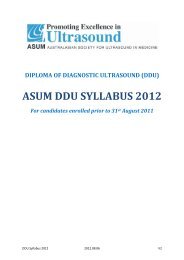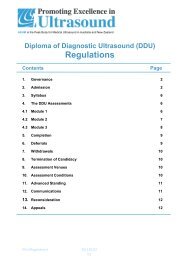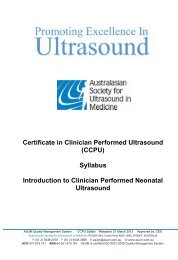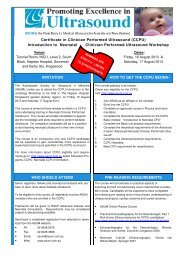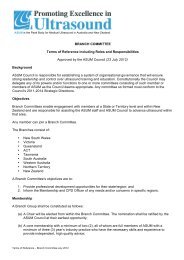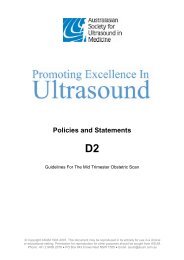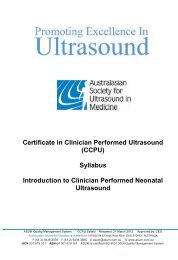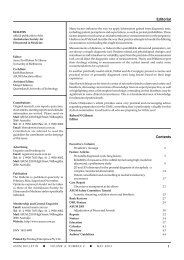Volume 11 Issue 1 (February) - Australasian Society for Ultrasound ...
Volume 11 Issue 1 (February) - Australasian Society for Ultrasound ...
Volume 11 Issue 1 (February) - Australasian Society for Ultrasound ...
You also want an ePaper? Increase the reach of your titles
YUMPU automatically turns print PDFs into web optimized ePapers that Google loves.
What factors are associated with parental desire to find out the sex of their baby?<br />
Table 2: Maternal sex preference based on previous children.<br />
Sex of children<br />
Prefer a girl<br />
n (%)<br />
Prefer a boy<br />
n (%)<br />
No sex preference<br />
n (%)<br />
Total<br />
n (100%)<br />
Equal sex or no previous children 12 (14.5) 5 (6.0) 66 (79.5) 83<br />
One girl and no boys 2 (6.3) 6 (18.8) 24 (75.0) 32<br />
One boy and no girls 7 (17.5) 1 (2.5) 32 (80.0) 40<br />
Unequal sex of children 16 (13.7) <strong>11</strong> (9.4) 90 (76.9) <strong>11</strong>7<br />
between the level of maternal and paternal education and<br />
the expectant mothers desire to find out the sex of the baby;<br />
74.8% of the mothers with a ‘school only’ education wanted<br />
to know the sex of the baby versus 49.1% of the university<br />
educated mothers (P = 0.002). When the expectant father<br />
had a ‘school only’ education, 70.2% of the mothers wanted<br />
to know the sex in comparison with 42.9% <strong>for</strong> university<br />
educated fathers (P = 0.015). As would be expected, income<br />
and education are significantly associated with each other in<br />
this research sample (P = 0.010) there<strong>for</strong>e, the same association<br />
is found <strong>for</strong> household income; a significantly higher<br />
percentage of mothers in the low-income class wanted to<br />
know the sex of the baby (P = 0.009).<br />
Finding out the sex of the baby and sex preference<br />
Overall, 64% of the mothers and 55.1% of the fathers<br />
wanted to know the sex of the baby. Of the parents, 29% did<br />
not agree with each other about finding out the sex of the<br />
baby. Of the mothers, 22% had a sex preference, of which<br />
14% preferred a girl and 8% preferred a boy. Of the fathers,<br />
29.6% had a sex preference, of whom 10.2% preferred a girl<br />
and 19.4% preferred a boy.<br />
Of all mothers wanting to know the sex of the baby<br />
29.7% had a sex preference and of all mothers not wanting<br />
to know the sex only 8.3% had a sex preference.<br />
Maternal sex preference based on previous children is<br />
shown in Table 2. A higher preference <strong>for</strong> a girl is noticeable<br />
when the expectant mother had no previous children or<br />
children with equal sex. The percentage of expectant mothers<br />
having a sex preference decreases 0.5% when having<br />
one boy and no girls and increases to 4.5% when having one<br />
girl and no boys and 2.6% when having unequal numbers of<br />
boys and girls, compared to having no children or an equal<br />
number of boys and girls. Having a sex preference increases<br />
the percentage of expectant mothers wanting to know the sex<br />
from 57.7% without having a preference to 86.4% <strong>for</strong> wanting<br />
to know and having a preference (P = 0.00).<br />
Current pregnancy<br />
Of the expectant parents, 69% had planned their pregnancy,<br />
of which, 85% got pregnant within 12 months and 6.6%<br />
needed medical intervention to get pregnant. Planning of<br />
pregnancy, the time needed to conceive or the way of conception<br />
did not influence the parental desire to find out the<br />
sex of the baby, 100% of all expectant mothers without a<br />
partner (6.5% of participants) wanted to know the sex of<br />
the baby be<strong>for</strong>e birth in comparison with 61.5% of expectant<br />
mothers with a partner. Being pregnant without having<br />
a partner is there<strong>for</strong>e significantly associated with desire to<br />
know the child’s sex (P = 0.005).<br />
<strong>Ultrasound</strong> examinations<br />
Of the Australian expectant mothers, 45% had had no previous<br />
scan per<strong>for</strong>med during their current pregnancy when<br />
visiting the hospital <strong>for</strong> NT; 35.5% had had one scan done<br />
be<strong>for</strong>e and 19.5% had had more than one. In 1.8%, problems<br />
were discovered with the baby on previous ultrasounds.<br />
None of these factors proved to make a difference in the<br />
maternal desire to know the baby’s sex.<br />
Pregnancy history<br />
Of the participants, 65.5% had one or more previous children,<br />
and of these 79.5% indicated that the previous children<br />
had the same father as their current baby. Having one or<br />
more children increases the percentage of expectant mothers<br />
wanting to know the sex of the baby from 50.7% <strong>for</strong> mothers<br />
without children to 71.0% <strong>for</strong> expectant mothers with<br />
previous children (P = 0.005). Further, 43.9% of the women<br />
with children found out the sex of all their previously born<br />
children be<strong>for</strong>e birth, 18.9% knew in a part of their pregnancies<br />
and 37.1% did not know the sex. If the mother knew the<br />
sex of all her previous children, 82.8% wanted to know the<br />
sex of this baby again, if they knew partially 96% wanted to<br />
know and if they did not know 44.9% changed their mind<br />
and wanted to know the sex during this pregnancy. Knowing<br />
the sex of previous children be<strong>for</strong>e birth is there<strong>for</strong>e significantly<br />
influencing maternal desire (P = 0.000).<br />
Women having a previous miscarriage (29.1% of the<br />
participants) wanted to know the sex 69% of the time compared<br />
with 61.7% of women without previous miscarriage<br />
(P = 0.330).<br />
Childbirth plans<br />
Expectant mothers planning not to breastfeed their baby<br />
(24% of all participants) wanted to know the sex of the<br />
baby more often (P = 0.013). Mothers planning to breastfeed<br />
wanted to know the sex in 58.6% of cases and this<br />
increased to 76.9% when the mother is planning not to<br />
breastfeed. Of the expectant mothers, 51.5% had thought of<br />
a name <strong>for</strong> their unborn child. The majority of mothers who<br />
had thought of a name <strong>for</strong> the child had thought of alternatives<br />
<strong>for</strong> both genders (38%). When the expectant mother<br />
had only been thinking about one name, slightly more<br />
mothers had thought only of a girl’s name (8.5%) rather<br />
than a boy’s name (5%). Naming the baby is not associated<br />
with wanting to know the sex of the baby less or more often<br />
(P = 0.974). Of the parents, 8.5% were planning to move<br />
based on the sex of the baby and a majority did want to<br />
know the sex in 88.2% v. 60.8% of cases when not planning<br />
to move (P = 0.030). Another factor significantly associated<br />
with wanting to know the sex was a lack of desire <strong>for</strong><br />
ASUM <strong>Ultrasound</strong> Bulletin 2008 <strong>February</strong> <strong>11</strong> (1)<br />
21


